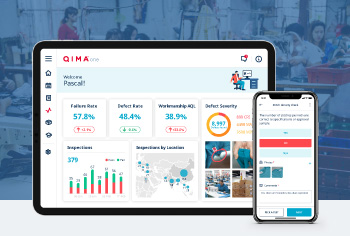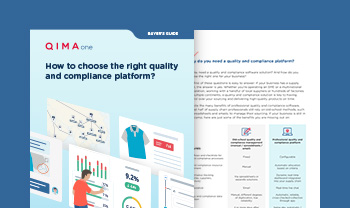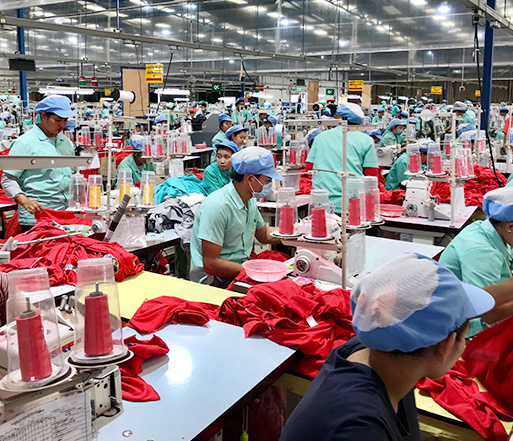
Article
How to Improve Supply Chain Efficiency

Article
How to Improve Supply Chain Efficiency
Article
How to Improve Supply Chain Efficiency

随时了解最新的供应链信息。
There is no "one-and-done" answer to the question of how to improve supply chain efficiency. Improvement is an ongoing process that requires continuously identifying and addressing manufacturing challenges.
However, supply chain efficiency improvements can be bolstered by cutting-edge technological solutions. It’s always useful to examine how companies are already using technology to improve their supply chain efficiency, and discover where more improvements can be made.
We will look at why supply chain efficiency is important, how successful businesses are using integrated quality management system software to make improvements, and how integrated software can be applied to production quality standards to further improve supply chain efficiency.
What is Supply Chain Efficiency, and Why is it Important?
Supply chain efficiency is a company’s ability to source materials, manufacture products, and deliver them to a specific market as quickly, accurately, and cost-effectively as possible.
Fundamentally, efficiency is simply good business sense, and something companies have always strived for; however, in today's competitive global climate, the stakes for efficient production have never been higher.
Customers have grown accustomed to an instant ordering process, rapid delivery, consistent product quality, and, increasingly, verification of ethical production standards.
How is Technology Helping Companies Improve Supply Chain Efficiency?
There is no shortage of supply chain collaboration software designed with greater efficiency in mind. Cloud-based platforms are already helping suppliers, manufacturers, and shippers improve in such areas as:
- Communication across supply chains: By providing all members of the supply chain with equal ability to communicate directly through a shared platform, companies can engage their downstream suppliers to collaborate as equal partners, not simply subordinates taking orders from upstream.
- Information sharing: When every link in the supply chain can contribute quality inspection data in a standardized, consolidated format, companies can reduce the risks associated with unclear or neglected reports.
- Data analysis: Over time, consolidated data can reveal quantifiable production trends, such as certain defects that are more likely to occur at a specific factory or a specific stage in the manufacturing process. You or your supplier’s quality team can use these numbers to address the root issue and make lasting changes.
Integrated Quality Inspection Programs Have Been Lagging Behind
While many integrated platforms exist to help improve supply chain efficiency, Testing, Inspection, and Certification (TIC) remains an often-neglected area.
This is primarily because most TIC service providers are late to the software game--even to their own digital transformation.
Fortunately, the few TIC service providers that are ahead of the curve understand the value of integrated solutions for improving supply chain efficiency.
Four Benefits of Integrated Software for Quality Control
1. Build Trust Across Your Supply Chain
Quality production is a shared responsibility. When you can give everyone--including vendors, suppliers, factory managers, and internal inspectors--the technology that allows them to easily collect data and share information, you give them a sense of partnership and agency, combined with the ability to directly contribute to your success.
2. Prompt Corrective Actions Earlier and with Less Waste
A shared platform helps inspectors and factory managers work together to stop production defects before waste and costs escalate. For example, when an inspector reports a production flaw through a shared platform, responsible managers can receive that information in real time, and make corrective action decisions in a quick and informed way. This is a simple yet clear example of improved supply chain efficiency in action.
Where a shared software platform builds trust, this kind of boosted efficiency also builds confidence. Supply chain partners feel confident when they are partnered with a company that can employ modern technology to navigate complicated testing standards and market regulations.
3. Provide In-House Training for Quality Control Managers, Inspectors, and Auditors
Too often, when product defects are discovered near the end of a production run, quality managers are under pressure to find a quick fix and minimize the commercial impact--even though by that time, it’s usually too late.
This situation can be avoided when a quality control manager is given online training that:
- keeps them up to date with industry regulations and best practices; and
- improves their troubleshooting and corrective action skills.
Quality assurance training in-house inspectors and auditors, including your company's market-specific requirements, ethical standards, and preferred auditing methodologies.
4. Automate Inspection Notifications and Third-Party Inspection Bookings
In a business environment that is constantly seeking to shorten production cycles, technologically-enhanced scheduling can improve supply chain efficiency in truly groundbreaking ways.
For example, automated QC inspection assignments will match inspectors with products they are best suited for based on their expertise, and issue them with appropriate workflows to follow. Furthermore, if your preferred inspection service provider is also included in your integrated platform, third-party inspections can be scheduled with one click whenever they are required.
How Can QIMAone Help?
QIMAone provides a unique opportunity for companies to improve their supply chain efficiency with a solution that can be seamlessly integrated into your existing workflows.
Our software is designed to:
- Adapt to your quality control and assurance processes.
- Save 40% of your inspection time compared to a paper-based approach;
- Automate inspector allocation based on location, availability and product expertise;
- Provide E-Learning tools shaped by 15 years of TIC service experience; and
- Easily customize workflows to fit your specific inspection requirements.
QIMAone software empowers your supply chain to improve efficiency without sacrificing quality.
Want to see QIMAone in action?
Learn more here or schedule a demo.














